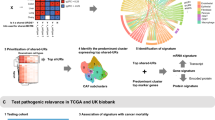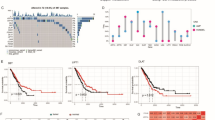Abstract
Sarcoma is a malignant tumor originating from mesenchymal tissue with a poor prognosis. Atypical chemokine receptor 1 (ACKR1) is found closely related to cancer progression. However, the effects of ACKR1 in soft tissue sarcoma have not been well investigated. Therefore, our present study is devoted to analyze the functions of ACKR1 in sarcoma progression and its potential mechanism. We detected the expression of ACKR1 in the Cancer Genome Atlas (TCGA)-pan-cancer database, TCGA-Sarcoma from TCGA databases, and GSE21122 from Gene Expression Omnibus (GEO) database. The relationships between ACKR1 expression, clinicopathological data, and survival status were evaluated in the TCGA-Sarcoma database. Moreover, overexpression negative control (OE-NC) and overexpression ACKR1 (OE-ACKR1) were used to further verify the effects of ACKR1 overexpression in the progression of sarcoma cells by using Reverse Transcription-Quantitative Polymerase Chain Reaction (RT-qPCR), cell counting kit-8 (CCK-8), 5-Ethyny-2’-Deoxyuridine (EdU), wound healing, transwell assay, and flow cytometry assays. Gene Ontology (GO), Kyoto Encyclopedia of Genes and Genomes (KEGG), and gene set enrichment analysis (GSEA) analyses were carried out to explore the potential enriched biological process of ACKR1 expression in sarcoma. Furthermore, tumor-immune system interactions databases (TISIDB) were applied to further confirm the relations between ACKR1 and tumor immune microenvironment in sarcoma. Our study found that ACKR1 is downregulated in multiple cancers (including sarcoma), and low expression of ACKR1 is related to poor survival status in sarcoma. The biological experiments found that promoting expression of ACKR1 can suppress sarcoma cell proliferation, migration, invasion, promote cell apoptosis, and arrest cell cycle. The GO-KEGG, GSEA, and TISIDB analysis showed that ACKR1 is related to the tumor immune microenvironment. In conclusion, low expression of ACKR1 presented as an independent prognostic biomarker in sarcoma. Overexpression of ACKR1 can significantly suppress cell progression ability in sarcoma by regulating the immune microenvironment.











Similar content being viewed by others
Data availability
The data and materials detailed information are included within the article.
References
Albarran V, Villamayor ML, Chamorro J, Rosero DI, Pozas J, San Roman M, Calvo JC, Perez de Aguado P, Moreno J, Guerrero P, Gonzalez C, Garcia de Quevedo C, Alvarez-Ballesteros P, Vaz MA (2022) Receptor tyrosine kinase inhibitors for the treatment of recurrent and unresectable bone sarcomas. Int J Mol Sci 23(22):13784
Blum A, Wang P, Zenklusen JC (2018) SnapShot: TCGA-analyzed tumors. Cell 173(2):530
Caiazza C, Brusco T, D’Alessio F, D’Agostino M, Avagliano A, Arcucci A, Ambrosino C, Fiume G, Mallardo M (2022) The lack of STING impairs the MHC-I dependent antigen presentation and JAK/STAT signaling in murine macrophages. Int J Mol Sci 23(22):14232
Cheng R, Santos HA (2023) Smart Nanoparticle-Based Platforms for Regulating Tumor Microenvironment and Cancer Immunotherapy. Adv Healthc Mater 12(8)
Das S, Faruqi S, Nordal R, Starreveld Y, Kelly J, Bowden G, Amanie J, Fairchild A, Lim G, Loewen S, Rowe L, Wallace C, Ghosh S, Patel S (2022) A phase III, multicenter, randomized controlled trial of preoperative versus postoperative stereotactic radiosurgery for patients with surgically resectable brain metastases. BMC Cancer 22(1):1368
Jenkins BD, Martini RN, Hire R, Brown A, Bennett B, Brown I, Howerth EW, Egan M, Hodgson J, Yates C, Kittles R, Chitale D, Ali H, Nathanson D, Nikolinakos P, Newman L, Monteil M, Davis MB (2019) Atypical chemokine receptor 1 (DARC/ACKR1) in breast tumors is associated with survival, circulating chemokines, tumor-infiltrating immune cells, and African ancestry. Cancer Epidemiol Biomarkers Prev 28(4):690–700
Jinna N, Rida P, Su T, Gong Z, Yao S, LaBarge M, Natarajan R, Jovanovic-Talisman T, Ambrosone C, Seewaldt V (2022) The DARC side of inflamm-aging: duffy antigen receptor for chemokines (DARC/ACKR1) as a potential biomarker of aging, immunosenescence, and breast oncogenesis among high-risk subpopulations. Cells 11(23):3818
Karthik N, Lee JJH, Soon JLJ, Chiu HY, Loh AHP, Ong DST, Tam WL, Taneja R (2022) Histone variant H3.3 promotes metastasis in alveolar rhabdomyosarcoma. J Pathol 259(3):342–356
Larrier NA, Kirsch DG, Riedel RF, Levinson H, Eward WC, Brigman BE (2013a) Practical radiation oncology for extremity sarcomas. Surg Oncol Clin N Am 22(3):433–443
Larrier NA, Kirsch DG, Riedel RF, Levinson H, Eward WC, Brigman BE (2013b) Practical radiation oncology for extremity sarcomas. Surg Oncol Clin N Am 22(3):433–443
Latini FR, Bastos AU, Arnoni CP, Muniz JG, Person RM, Baleotti W Jr, Barreto JA, Castilho L, Cerutti JM (2013) DARC (Duffy) and BCAM (Lutheran) reduced expression in thyroid cancer. Blood Cells Mol Dis 50(3):161–165
Lee JS, Frevert CW, Wurfel MM, Peiper SC, Wong VA, Ballman KK, Ruzinski JT, Rhim JS, Martin TR, Goodman RB (2003) Duffy antigen facilitates movement of chemokine across the endothelium in vitro and promotes neutrophil transmigration in vitro and in vivo. J Immunol 170(10):5244–5251
Li Y, Hu X, Lin R, Zhou G, Zhao L, Zhao D, Zhang Y, Li W, Zhang Y, Ma P, Ren H, Liao X, Niu P, Wang T, Zhang X, Wang W, Gao R, Li Q, Church G et al (2022a) Single-cell landscape reveals active cell subtypes and their interaction in the tumor microenvironment of gastric cancer. Theranostics 12(8):3818–3833
Li Z, Wang M, Tan J, Zhu L, Zeng P, Chen X, Xie L, Duan R, Chen B, Tao T, Wang R, Wang X, Su W (2022b) Single-cell RNA sequencing depicts the local cell landscape in thyroid-associated ophthalmopathy. Cell Rep Med 3(8):100699
Lv M, He F, Guo J, Zheng Z, Wang W, Xie J (2022) Identification of hub genes correlated with tumor-associated M1-like macrophage infiltration in soft tissue sarcomas. Front Genet 13:999966
Maeda S, Kuboki S, Nojima H, Shimizu H, Yoshitomi H, Furukawa K, Miyazaki M, Ohtsuka M (2017) Duffy antigen receptor for chemokines (DARC) expressing in cancer cells inhibits tumor progression by suppressing CXCR2 signaling in human pancreatic ductal adenocarcinoma. Cytokine 95:12–21
Nicolo E, Giugliano F, Ascione L, Tarantino P, Corti C, Tolaney SM, Cristofanilli M, Curigliano G (2022) Combining antibody-drug conjugates with immunotherapy in solid tumors: current landscape and future perspectives. Cancer Treat Rev 106:102395
Ru B, Wong CN, Tong Y, Zhong JY, Zhong SSW, Wu WC, Chu KC, Wong CY, Lau CY, Chen I, Chan NW, Zhang J (2019) TISIDB: an integrated repository portal for tumor-immune system interactions. Bioinformatics 35(20):4200–4202
Rushdi MN, Pan V, Li K, Choi HK, Travaglino S, Hong J, Griffitts F, Agnihotri P, Mariuzza RA, Ke Y, Zhu C (2022) Cooperative binding of T cell receptor and CD4 to peptide-MHC enhances antigen sensitivity. Nat Commun 13(1):7055
Salguero-Aranda C, Olmedo-Pelayo J, de Alava E, Amaral AT, Diaz-Martin J (2022) Genetic alterations and deregulation of hippo pathway as a pathogenetic mechanism in bone and soft tissue sarcoma. Cancers (Basel) 14(24):6211
Smith KB, Indelicato DJ, Knapik JA, Lagmay JP, Morris C, Kirwan JM, Zlotecki RA, Scarborough MT, Gibbs CP, Marcus RB (2011) Adjuvant radiotherapy for pediatric and young adult nonrhabdomyosarcoma soft-tissue sarcoma. Int J Radiat Oncol Biol Phys 81(1):150–157
Sun G, Wang Y, Zhu Y, Huang C, Ji Q (2011) Duffy antigen receptor for chemokines in laryngeal squamous cell carcinoma as a negative regulator. Acta Otolaryngol 131(2):197–203
Tang F, Tie Y, Wei YQ, Tu CQ, Wei XW (2021) Targeted and immuno-based therapies in sarcoma: mechanisms and advances in clinical trials. Biochim Biophys Acta Rev Cancer 1876(2):188606
Thirasastr P, Brahmi M, Dufresne A, Somaiah N, Blay JY (2022) New drug approvals for sarcoma in the last 5 years. Surg Oncol Clin N Am 31(3):361–380
Tian Z, Yao W (2023) Chemotherapeutic drugs for soft tissue sarcomas: a review. Front Pharmacol 14:1199292
Tong Y, Pi Y, Cui Y, Jiang L, Gong Y, Zhao D (2022) Early distinction of lymph node metastasis in patients with soft tissue sarcoma and individualized survival prediction using the online available nomograms: a population-based analysis. Front Oncol 12:959804
Yang J, Xu Y, Chen Y, Li T, Zhang X, Hu T, Xing R, Yang Y (2022a) Therapeutic perspectives for adult soft tissue sarcoma-updates from the 2022 ASCO annual meeting. Cancer Biol Med 19(10):1496–1502
Yang Y, Ye F, Xia T, Wang Q, Du J (2022b) High MICAL1 expression correlates with cancer progression and immune infiltration in renal clear cell carcinoma. BMC Cancer 22(1):1355
Yin Q, Srivastava K, Gebremedhin A, Makuria AT, Flegel WA (2018) Long-range haplotype analysis of the malaria parasite receptor gene ACKR1 in an East-African population. Hum Genome Var 5:26
Zhu Q, Jiang L, Wang X (2017) The expression of Duffy antigen receptor for chemokines by epithelial ovarian cancer decreases growth potential. Oncol Lett 13(6):4302–4306
Zou MZ, Liu WL, Chen HS, Bai XF, Gao F, Ye JJ, Cheng H, Zhang XZ (2021) Advances in nanomaterials for treatment of hypoxic tumor. Natl Sci Rev 8(2):nwaa160
Funding
Startup Fund for Scientific Research, Fujian Medical University (No. 2018QH1089).
Author information
Authors and Affiliations
Contributions
Conceptualization, JHL; writing—original draft, JLL and FDL; writing—review and editing, JHL and JLL; formal analysis, LFZ and JYZ; data curation, all authors. All authors read and approved the final manuscript.
Corresponding author
Ethics declarations
Ethics approval and consent to participate
Not applicable.
Consent for publication
Not applicable.
Competing interests
The authors declare no competing interests.
Additional information
Communicated by: Ewa Ziętkiewicz
Publisher’s note
Springer Nature remains neutral with regard to jurisdictional claims in published maps and institutional affiliations.
Rights and permissions
Springer Nature or its licensor (e.g. a society or other partner) holds exclusive rights to this article under a publishing agreement with the author(s) or other rightsholder(s); author self-archiving of the accepted manuscript version of this article is solely governed by the terms of such publishing agreement and applicable law.
About this article
Cite this article
Lin, J., Liang, F., Zheng, L. et al. High expression of ACKR1 predicts a good prognosis and suppresses sarcoma cell progression via regulating the tumor immune microenvironment. J Appl Genetics 65, 121–136 (2024). https://doi.org/10.1007/s13353-023-00805-4
Received:
Revised:
Accepted:
Published:
Issue Date:
DOI: https://doi.org/10.1007/s13353-023-00805-4




